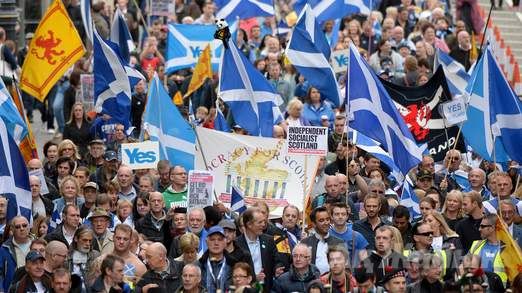 ndependence supporters say it will be fairer to 'divorce' the UKThe SNP has launched its blueprint for independence claiming each person would be £600 better off if it left the UK.
ndependence supporters say it will be fairer to 'divorce' the UKThe SNP has launched its blueprint for independence claiming each person would be £600 better off if it left the UK.
Better childcare and education, a reformed, fairer tax system are being promised under an independent Scotland.
Laying out his blueprint for Scotland's future, the First Minister, Alex Salmond, also said that each Scot would be £600 better off.
It is a figure which sharply contrasts with a Treasury analysis, which claims independence would cost the average Scot £1,000 in tax.
But at the launch event in Glasgow, Mr Salmond has robustly argued that Scotland's public finances are "healthier than those of the UK as a whole".
As a result of this, the Scottish National Party (SNP) blueprint says: "There will be no requirement for an independent Scotland to raise the general rate of taxation to fund existing levels of spending."
In the 670-page document entitled Scotland's Future - Your Guide Mr Salmond has vowed to end controversial and unpopular welfare reforms introduced by Westminster, including the bedroom tax and the Universal Credit System.
He has also pledged an independent Scotland would provide free childcare for all pre-school children. It also promised a cap on payday lenders - one policy he has in common with the Chancellor George Osborne.
Scotland's Future pinpoints "three overriding reasons" for Scotland to leave the UK - it will create a more democratic, prosperous and fair state.
Speaking at the launch Mr Salmond said: "Our vision is of an independent Scotland regaining its place as an equal member of the family of nations. However, we do not seek independence as an end in itself, but rather as a means to changing Scotland for the better.
"We know we have the people, the skills and resources to make Scotland a more successful country. What we need now are the economic tools and powers to build a more competitive, dynamic economy and create more jobs.
 Pro-independence supporters march through Edinburgh in September"This guide contains policies which offer nothing less than a revolution in employment and social policy for Scotland, with a transformational change in childcare at the heart of those plans.
Pro-independence supporters march through Edinburgh in September"This guide contains policies which offer nothing less than a revolution in employment and social policy for Scotland, with a transformational change in childcare at the heart of those plans.
"Our proposals will make it far easier for parents to balance work and family life, and will allow many more people, especially women, to move into the workforce, fostering economic growth and helping to boost revenues - which will in itself help pay for the policy.
"With these policies, we can begin the job of undoing the damage caused by the vast social disparities which have seen the UK become one of the most unequal societies in the developed world."
The SNP also plans to keep the pound in a currency union with the Bank of England, although opponents claim there is no guarantee that the rest of the UK would find that acceptable.
The paper states "the pound is Scotland's currency just as much as it is the rest of the UK's" saying that an independent Scotland would also make a "substantial contribution" to a "sterling zone".
It also states that the membership of an independent Scotland in the European Union and Nato would continue, although critics point out that this cannot be guaranteed.
Under the proposals, if the people of Scotland vote for independence in a referendum then Scottish Independence Day would be March 24, 2016.
The date will resonate with the Scottish people as on March 24, 1707, the Act of Union, which joined the parliaments of England and Scotland, was signed.
Former chancellor Alistair Darling, who is also leader of the Better Together Campaign, accused Mr Salmond of asking people to buy a "one-way ticket to a very uncertain destination".
He said: "They have ducked the big questions like on currency: how can we guarantee to keep the pound and if we don't what currency will we use, will we have our own or will we join the Euro?
"Debt, defence, welfare, pensions: they haven't answered any of those questions and you would have thought that at this time we would get the answers we are entitled to."
He said that the referendum vote on September 16 next year would be closer than people thought - with 1 million of the 4 million electorate still undecided.
 В Атырау -10
В Атырау -10